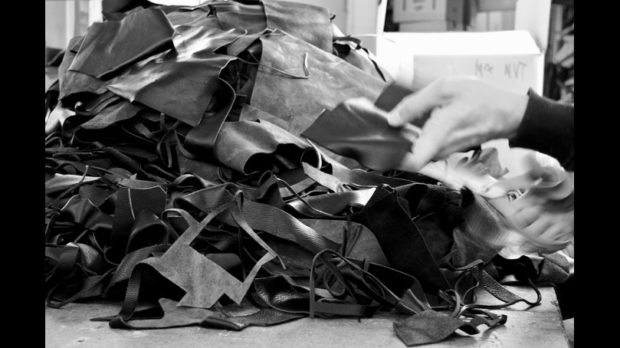Elvis & Kresse, a British maker of leather goods, loves scrap. They’ve built a profitable business by transforming tens of tons of fire hoses decommissioned by Fire Brigades across the UK each year into consumer products. As the co-founding couple incubated their venture, launched in 2005, products evolved from roof tiles to belts, bags, wallets, rugs, upholstery and other leather products made with the durable material.
We just put the material there and said, ‘okay, what can we do with that?’


The founders’ mission, chronicled in an article by the London Entrepreneurship Review of the London Business School, focuses on a material, rather than on a particular product or market. “We just put the material there and said, ‘okay, what can we do with that?’” explained co-founder Kresse Wesling, a Canadian who had previously worked in venture capital for two years in Hong Kong.
Building on their fire hose success, Elvis & Kresse also now reclaim other leather scraps (fire hoses apparently are just the tip of the scrap-leather iceberg, with an estimated 180,000 tons of thrown away globally each year), cardboard shoeboxes, burlap coffee sacks, silk parachutes and anything else that catches their fancy when visiting land fills and industrial waste sites. All finished products are assembled from pieces precut into various geometric forms using a proprietary process at vertically integrated manufacturing plants in Kent, England, and Istanbul, Turkey.1 2
Apparently, they apply resourcefulness to other aspects of the business as well. Their offices are located in a converted rundown flour mill, the 10-person venture is solely funded by sales of its products, and they reportedly contribute 50% of profits to the firefighters charity, ensuring a steady supply of decommissioned hoses and enhancing their brand with consumers who care about environmental sustainability.
A startup does not have to be ecologically minded to be resourceful. Some look at artifacts of business processes and wonder whether they might offer incremental business opportunities. Occasionally, those resources end up girding enterprise value. Customer data, for example, might yield marketable business intelligence. Or physical byproducts of a manufacturing process might turn out to be valuable resources in other markets.
These potentially valuable inventories of underutilized resources might be commodities like leather scraps, cotton patches or beeswax (think Burt’s Bees, which launched with crafts made from the byproduct of Burt Shavit’s honey business). Or they might be intangible stocks like computer server bandwidth (think Amazon Web Services), information services (think American Airlines’ Sabre reservation system) or social capital (think FUBU founders’ personal relationships with hip-hop artists who promoted their clothing products).
Founders I advise only rarely pay attention to such potential veins of gold, though. They generally consider activities not immediately tied to revenue generation as defocusing. I argue that focus is in the eye of the beholder; sometimes it might be justifiably limited to a specific product or service. But it also might be broadened to include the entire system of stocks and flows a startup’s business model comprises. Focus should not become an excuse for neglecting money-making opportunities.
By bootstrapping, startup artisans transform resource limitations into enablers of creativity and control for themselves and their teams.